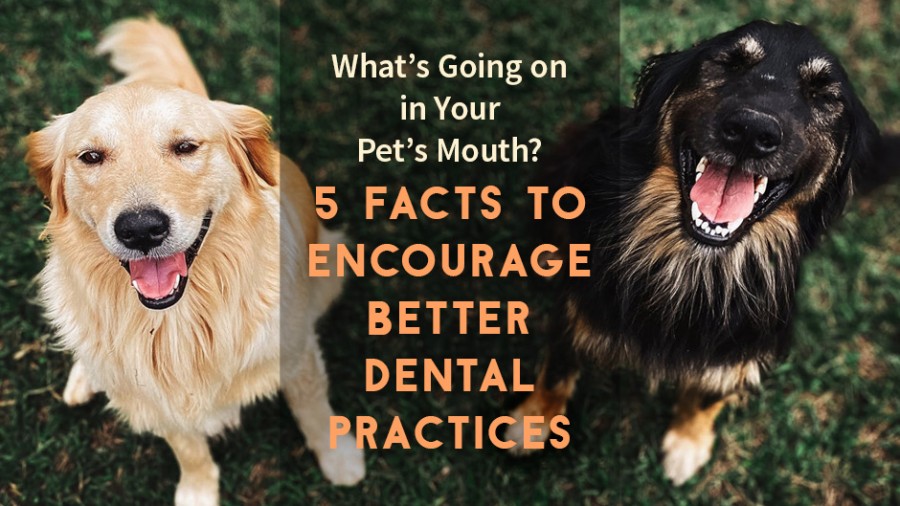Here's something to sink your teeth into: Your dog's mouth has over 600 different types of bacteria. When it comes to kitties, the bacteria in a cat's mouth is often more dangerous than the wound alone if a cat bites you. And while bacteria is just gross. It also causes bad breath and worse for your pet. What other facts hide behind your pet' bicuspids?
5 Frightening Facts About Your Pet's Mouth
1. Is your pet's mouth cleaner than yours?
No way! You've probably heard the myth that your dog's mouth is cleaner than yours. While dogs are less likely to suffer from cavities (considering they don't eat as much sugar as we do), dogs are just are equally prone to dental disease. We also have the added benefit of brushing our teeth without assistance.
As for cats, their mouths contain Pasteurella multocida, a bacteria that causes rapid infection in people. And while cats tend to be clean creatures, their mouths are far from it.
2. Human toothpaste can kill your dog
While this may sound extreme to you, it's true. Xylitol, the sweetener that makes your toothpaste sweet can be fatal for dogs. Xylitol causes a rapid and dangerous decrease in insulin which can permanently damage the pancreas and cause a hypoglycemic reaction within 10 minutes to an hour of ingesting this sugar-replacement.
While there aren't as many studies on the effects of xylitol on ferrets, the ones that have been done show this substance can cause ferrets to have seizures and low blood sugar.
3. 40% of cats suffer from feline tooth resorption
This condition is as odd as it sounds, and while it may be new to you, it's the most common dental disease domestic cats develop.
Feline tooth resorption occurs when a cat's body breaks down the tooth structure. Over time, the tooth will completely disappear.
Feline tooth resorption breaks down the enamel next to the gumline, first. Then, continues to eat away at the tooth down to the center. Eventually, the cat is left with just a lump on the gums where the tooth once was.
This problem is very painful for cats.
If you're unsure if your cat has tooth resorption, look for the most common symptoms:
- Lines or small holes in teeth: These lines can follow the structure of the tooth. They become visible because they tend to discolor more quickly than the rest of the tooth.
- Difficulty chewing: If your cat looks like she's nodding or bobbing her head side to side while eating, she may feel a bit of pain as she eats.
- A sudden shift in behavior: when a cat experiences pain, they're good at hiding it. They also tend to withdraw and hide when they feel less-than-their-best.
- Drooling
- Bleeding gums
If you suspect your cat has feline tooth resorption, give us a call.
4. Your pet's dental health is connected to their lifespan
When you take care of your pet's oral health with dental cleanings, dental exams, brushing, healthy chew toys and treats, and water additives, you can add 2 to 5 years to your pet's life.
Gum disease can make your pet's organs vulnerable to bacteria. As bacteria digs deeper and deeper below your pet's gumline, it can enter the bloodstream and travel to the heart, lungs, kidneys, and other vital organs. Studies even link pet heart disease to gum disease.
Cats infected with feline leukemia, feline calicivirus, and immunodeficiency, often also suffer from oral disease.
5. 80% of dogs and 70% of cats have signs of gum disease by the time they're three
Many pet parents don't worry about their pet's dental health until it becomes a problem. Unfortunately, it's often too late to save a tooth and fully restore your pet's oral health.
Gum disease and other dental issues can be prevented with regular cleanings and vigilance on your part. Considering it takes 24 hours for plaque to attach and harden, it takes daily care to keep your pet's mouth healthy.
Bonus Fact: Dental Cleanings Are Less Costly Than Treatment
Cleanings are a fraction of the price of surgery, X-rays, and extractions.
Until your pet learns to call and make her own appointment, the responsibility falls on you. You can prevent your pet from years of oral pain and damage. Give us a call, and we can take peek inside your pet's mouth. And that is a reason to smile!
Image credit: Pexels

